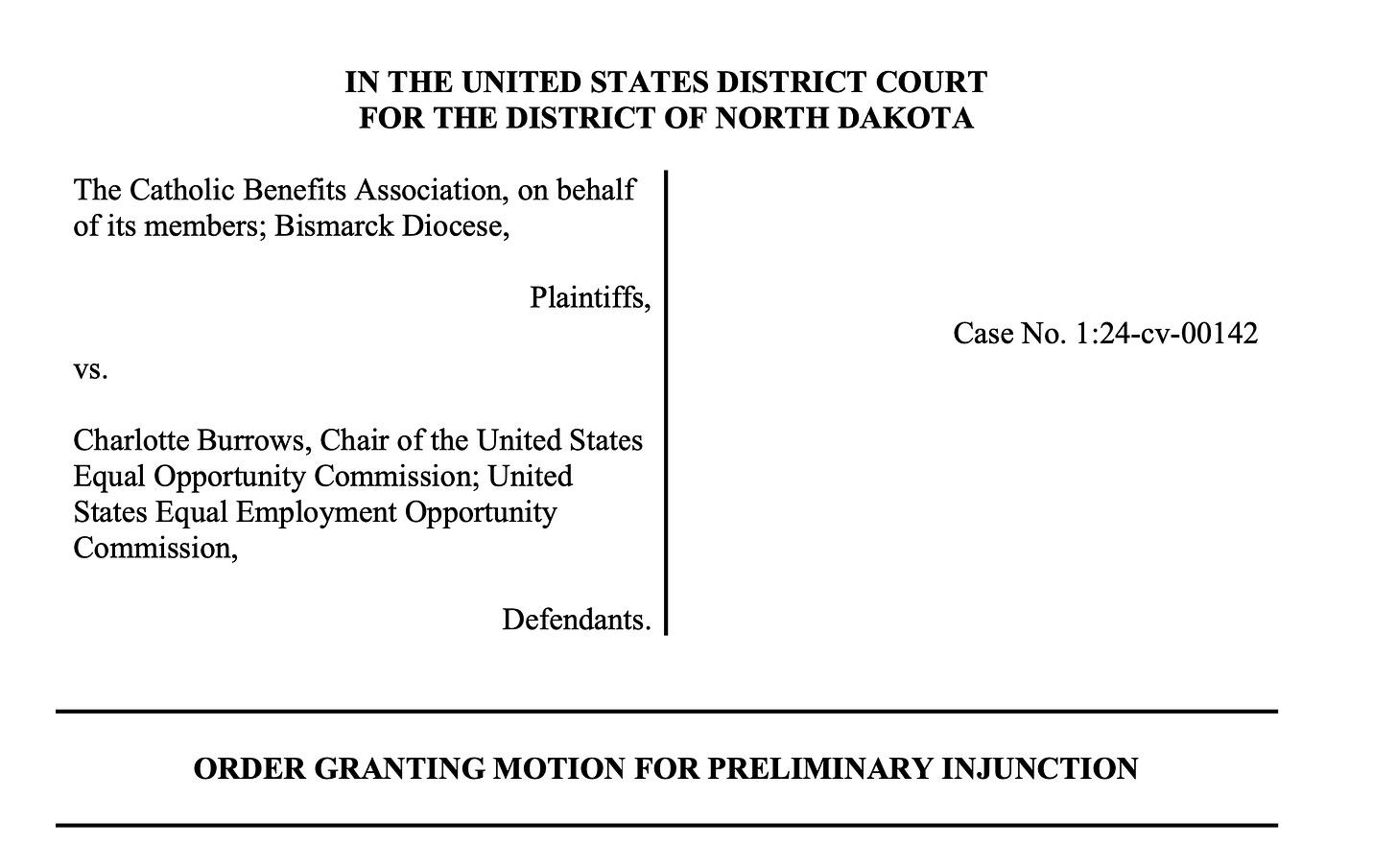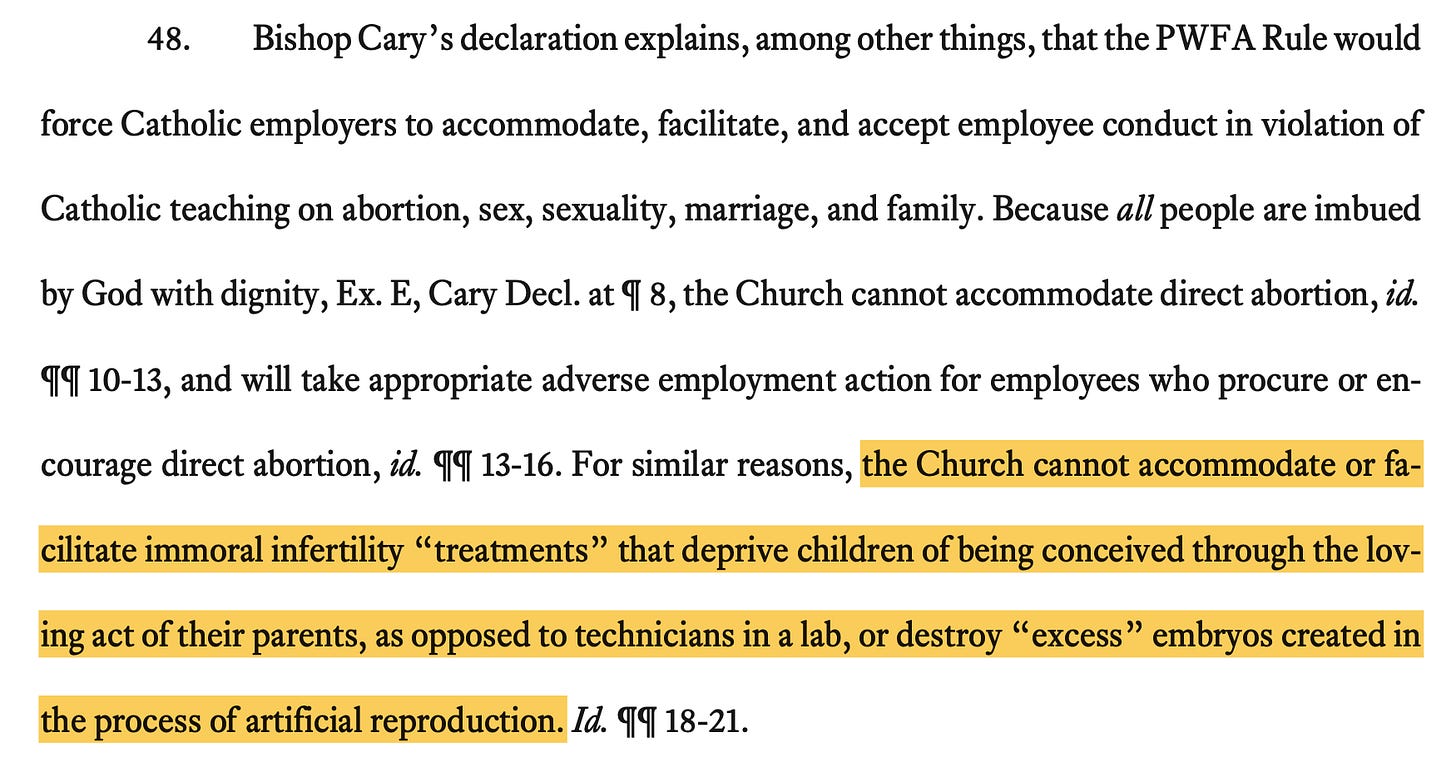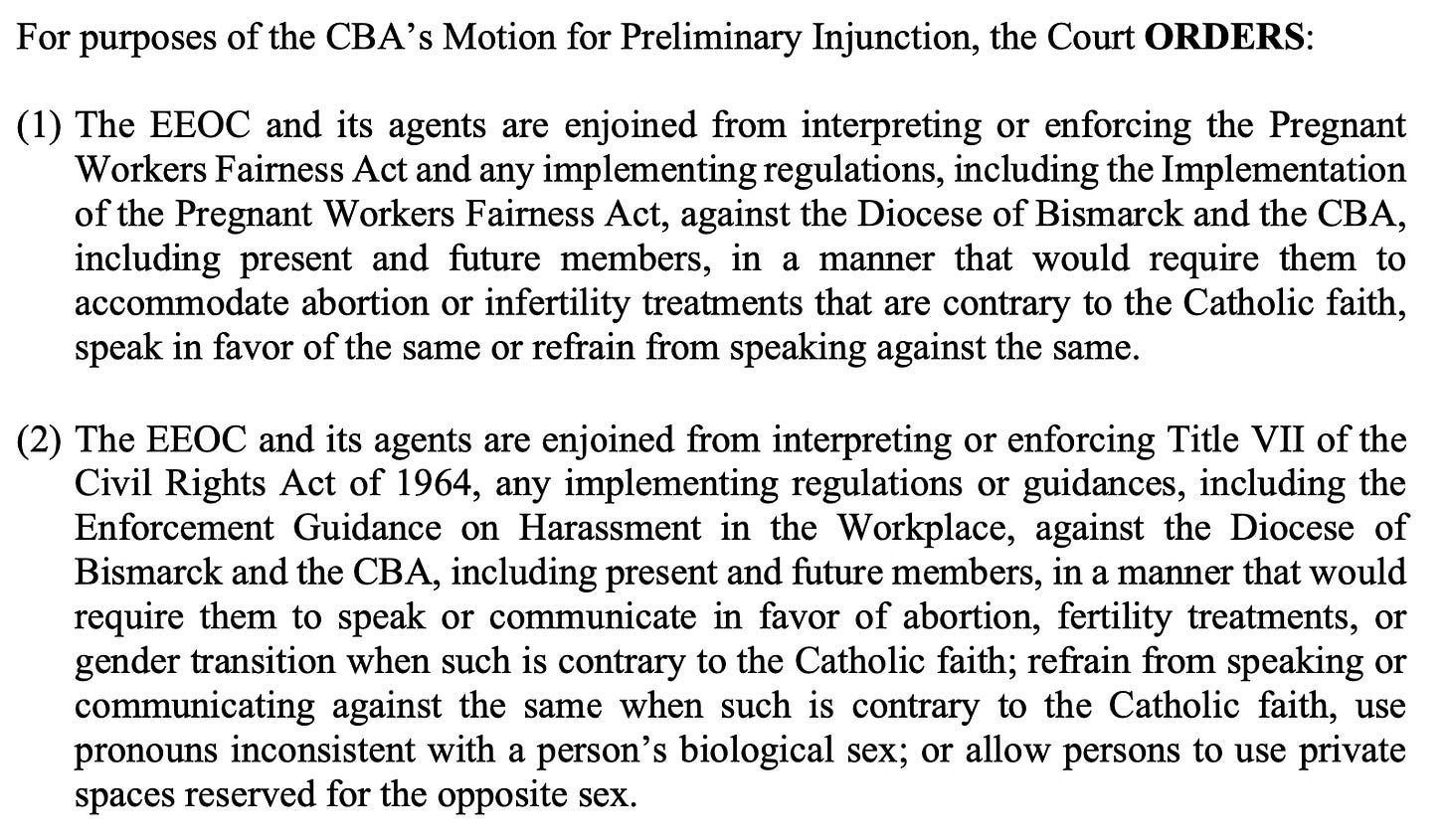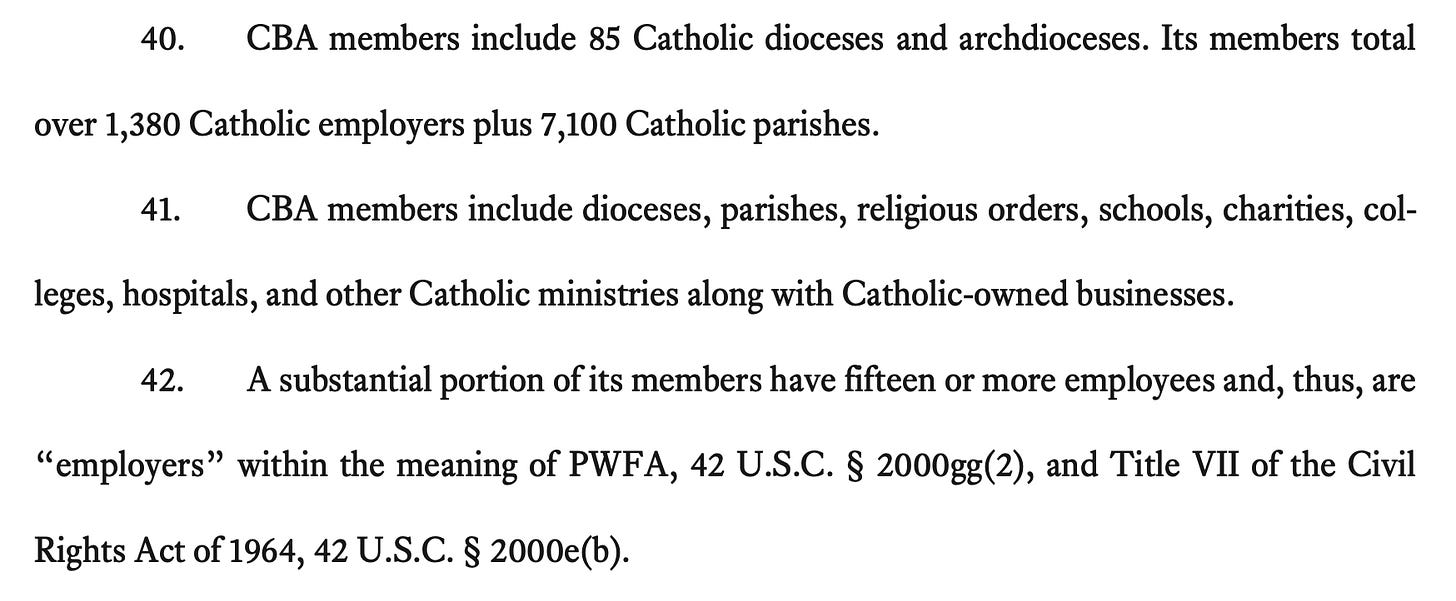Federal judge blocks employee abortion, IVF protections at thousands of Catholic employers nationwide
The group that brought the challenge to a new federal policy argues it cannot be forced to accommodate "immoral infertility 'treatments.'"
A federal judge in North Dakota issued an injunction on Monday blocking the Equal Employment Opportunity Commission from protecting any employees of any members of a nationwide Catholic association who are seeking time off or other accommodations under the Pregnant Workers Fairness Act for an abortion or in vitro fertilization treatment.
U.S. District Judge Daniel Traynor, a Trump appointee to the federal court in North Dakota, issued the religion-infused preliminary injunction to partially block enforcement of an EEOC rule implementing the 2022 law, along with related implementation of Title VII of the Civil Rights Act of 1964, as to the Catholic Benefits Association and its members — current or future — nationwide.
The order covers more than 8,000 employers — including thousands of churches — across the country.
The PWFA was passed in December 2022 and is supposed to protect covered workers from discrimination on the basis of “pregnancy, childbirth, or related medical conditions” by, in part, requiring employers to provide employees with reasonable accommodations. The EEOC proposed its implementing rule for the PWFA in August 2023, stating in part that abortion and fertility treatment, including IVF, are covered by the law’s protections. That rule, which does not relate to insurance coverage, went into effect in June.
“It is a precarious time for people of religious faith in America,” Traynor declared in the introduction to his 21-page opinion, criticizing “the repeated illegal and unconstitutional administrative actions against one of the founding principles of our country, the free exercise of religion.”
Ultimately, Traynor concluded that happened again here, finding that the CBA is likely to succeed in its challenge to the rule and related Title VII enforcement guidance under the Religious Freedom Restoration Act.
Any appeal would go to the U.S. Court of Appeals for the Eighth Circuit, which only has one Democratic appointee among its 11 judges.
“This challenge to religious liberty is a reminder of the danger of government action that is clearly anti-religion,” Traynor wrote. “It should not take a legal challenge for the Agency to stop violating the constitutional rights of Americans.”
The CBA, along with the Bismark Diocese, did not even file their lawsuit until late July and did not seek their preliminary injunction until nearly a week later. Despite that, Traynor “d[id] not find [the] two-month delay significant” when deciding the preliminary injunction request.
The lawsuit itself stands out for its extreme opposition to fertility treatments:
The lawsuit also detailed its opposition to the EEOC’s protection of such treatments under the PWFA rule, as detailed in the Notice of Proposed Rulemaking (NPRM):
Traynor sided with the Catholic employees — rejecting the EEOC’s arguments — on virtually all points, from standing to the underlying religious freedom claims to the scope of his eventual injunction. (Notably, Traynor gave little credit to the EEOC’s argument that “the Final Rule and Guidance acknowledge that employers may have RFRA defenses and commit to a fact-sensitive, case-by-case analysis.” Instead, he found that such an approach is not likely sufficient because the “burden of investigation and possible litigation” would remain.)
The injunction is extremely broad, barring the EEOC from enforcing accommodations required under the PWFA rule relating to “abortion or infertility treatments,” along with guidance relating to “abortion, fertility treatments, or gender transition“ under Title VII, including recent workplace harassment guidance.
Specifically, he wrote:
Those members, the CBA even acknowledged, include for-profit businesses.
Although the EEOC pushed back on allowing such groups into the litigation in its opposition to the injunction request, citing a case from the U.S. Court of Appeals for the Third Circuit in which the court detailed that a “religious organization exemption would not extend to an enterprise involved in a wholly secular and for-profit activity,” Traynor rejected that on Monday. Instead, he ruled that because “membership in the CBA requires these businesses to be ‘committed to providing no benefits or services inconsistent with Catholic values,’” they should be exempted from the law because their making such a “declaration and membership in a voluntary organization necessarily means that no organization is ‘wholly secular.’”
That is an extreme ruling that, if upheld by a higher court, could have dramatic consequences.
What’s more, Traynor’s injunction covers “present and future” CBA members.
In other words, the injunction is open-ended, includes for-profit businesses that say they’re Catholic and agree with the CBA’s positions, and is — in its potential effect — nationwide in scope.
Also, we don’t know how many for-profit businesses are members.
We do know from the complaint, however, that nearly half of the Catholic dioceses in America are members of the CBA: 85 of 194.
Monday’s injunction represented a significant expansion of an earlier injunction issued against the rule by a different Trump appointee on the day before the rule was set to go into effect back in June.
In that ruling, U.S. District Judge David Joseph, in the Western District of Louisiana, blocked the enforcement of the rule’s requirement “that covered entities provide accommodation for the elective abortions of employees that are not necessary to treat a medical condition related to pregnancy“ as to Louisiana, Mississippi, United States Conference of Catholic Bishops, two dioceses, and the Catholic University of America.
At the same time, U.S. District Judge D.P. Marshall Jr., an Obama appointee in Arkansas, rejected a request for a nationwide injunction blocking the abortion-related protections in a case brought by 17 Republican-led states, finding that “those fact-intensive disputes” in which a conflict could arise between an employer and the rule’s abortion-related protections “are best settled on a case-by-case basis, through the administrative process and litigation if need be, not in a pre-enforcement challenge to the EEOC's regulation.” He found the states lacked standing to bring the pre-enforcement challenge.
The states appealed that ruling, and the Eighth Circuit heard arguments over the standing question on Tuesday. The three-judge panel was all Republican appointees: Chief Judge Steven Colloton (George W. Bush) and Judges James Loken (George H.W. Bush) and Jonathan Kobes (Trump).
On the standing issue that was the focus of Tuesday’s arguments, the lawyers for the states and for the EEOC both faced skeptical questions — with significant questions about the states’ claimed harms and the EEOC’s claims that the states’ alleged compliance costs aren’t sufficient to show injury from the rule. A win for the states on standing grounds would send the case back to Marshall for further consideration.
But, importantly, both of those lawsuits only addressed the abortion-related provision of the PWFA rule. The CBA case — and Monday’s injunction — is the only one that includes an attack on the fertility protections included in the rule.
This is a breaking news story that was updated and expanded after initial publication. The most recent update was made at 1:45 p.m. Check back at Law Dork for the latest.








Wake up women. Do not work for any religious organization for any reason. They want to control every aspect of your life.
In addition, this is why control of the senate is so critical. Moscow Mitch, the Heritage Foundation, and the federalist society are all salivating at appointing more religious zealots to the bench.
Unfortunately it looks like they will get their way.
Vote out every Republican.
Of course the religious people see themselves as the real victims here...